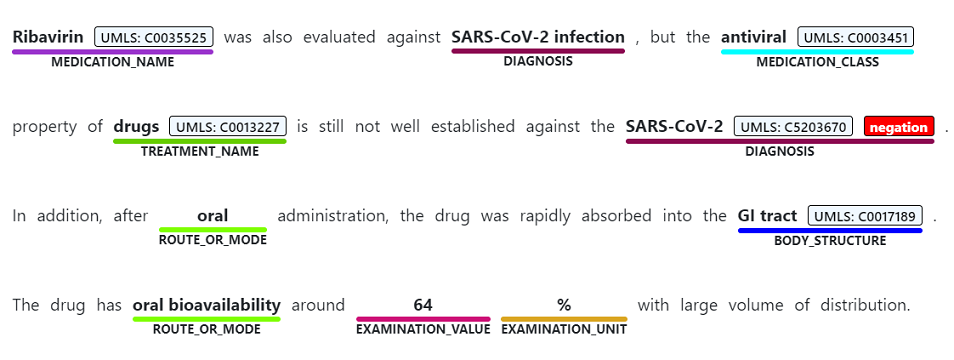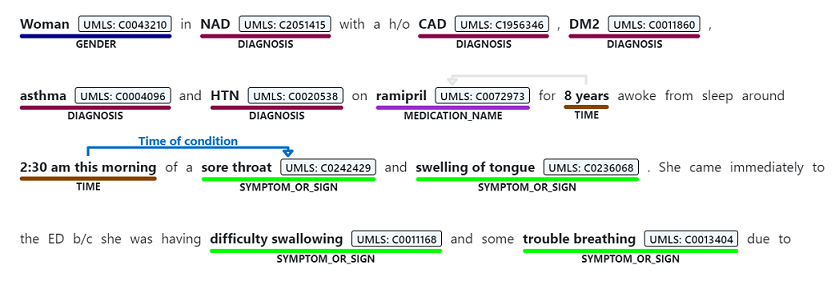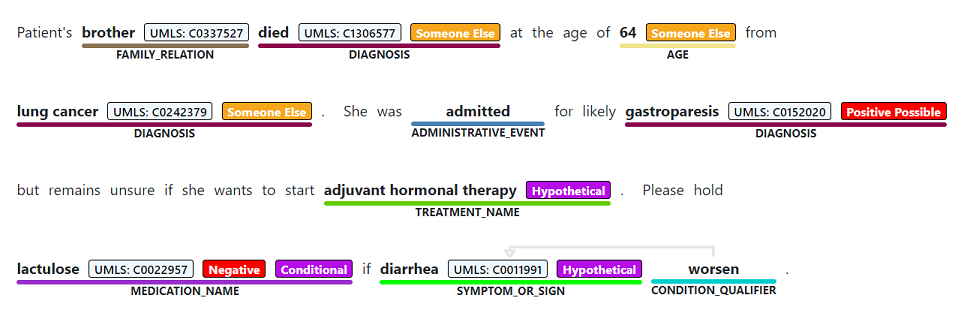What is Text Analytics for health?
Important
Text Analytics for health is a capability provided “AS IS” and “WITH ALL FAULTS.” Text Analytics for health is not intended or made available for use as a medical device, clinical support, diagnostic tool, or other technology intended to be used in the diagnosis, cure, mitigation, treatment, or prevention of disease or other conditions, and no license or right is granted by Microsoft to use this capability for such purposes. This capability is not designed or intended to be implemented or deployed as a substitute for professional medical advice or healthcare opinion, diagnosis, treatment, or the clinical judgment of a healthcare professional, and should not be used as such. The customer is solely responsible for any use of Text Analytics for health. The customer must separately license any and all source vocabularies it intends to use under the terms set for that UMLS Metathesaurus License Agreement Appendix or any future equivalent link. The customer is responsible for ensuring compliance with those license terms, including any geographic or other applicable restrictions.
Text Analytics for health now allows extraction of Social Determinants of Health (SDOH) and ethnicity mentions in text. This capability may not cover all potential SDOH and does not derive inferences based on SDOH or ethnicity (for example, substance use information is surfaced, but substance abuse is not inferred). All decisions leveraging outputs of the Text Analytics for health that impact individuals or resource allocation (including, but not limited to, those related to billing, human resources, or treatment managing care) should be made with human oversight and not be based solely on the findings of the model. The purpose of the SDOH and ethnicity extraction capability is to help providers improve health outcomes and it should not be used to stigmatize or draw negative inferences about the users or consumers of SDOH data, or patient populations beyond the stated purpose of helping providers improving health outcomes.
Text Analytics for health is one of the prebuilt features offered by Azure AI Language. It is a cloud-based API service that applies machine-learning intelligence to extract and label relevant medical information from a variety of unstructured texts such as doctor's notes, discharge summaries, clinical documents, and electronic health records.
Tip
Try out Text Analytics for health in Azure AI Foundry portal, where you can utilize a currently existing Language Studio resource or create a new Azure AI Foundry resource in order to use this service.
This documentation contains the following types of articles:
- The quickstart article provides a short tutorial that guides you with making your first request to the service.
- The how-to guides contain detailed instructions on how to make calls to the service using the hosted API or using the on-premises Docker container.
- The conceptual articles provide in-depth information on each of the service's features, named entity recognition, relation extraction, entity linking, and assertion detection.
Text Analytics for health features
Text Analytics for health performs four key functions which are named entity recognition, relation extraction, entity linking, and assertion detection, all with a single API call.
Named entity recognition is used to perform a semantic extraction of words and phrases mentioned from unstructured text that are associated with any of the supported entity types, such as diagnosis, medication name, symptom/sign, or age.

Text Analytics for health can receive unstructured text in English, German, French, Italian, Spanish, Portuguese, and Hebrew.
Additionally, Text Analytics for health can return the processed output using the Fast Healthcare Interoperability Resources (FHIR) structure which enables the service's integration with other electronic health systems.
Usage scenarios
Text Analytics for health can be used in multiple scenarios across a variety of industries. Some common customer motivations for using Text Analytics for health include:
- Assisting and automating the processing of medical documents by proper medical coding to ensure accurate care and billing.
- Increasing the efficiency of analyzing healthcare data to help drive the success of value-based care models similar to Medicare.
- Minimizing healthcare provider effort by automating the aggregation of key patient data for trend and pattern monitoring.
- Facilitating and supporting the adoption of HL7 standards for improved exchange, integration, sharing, retrieval, and delivery of electronic health information in all healthcare services.
Example use cases:
| Use case | Description |
|---|---|
| Extract insights and statistics | Identify medical entities such as symptoms, medications, diagnosis from clinical and research documents in order to extract insights and statistics for different patient cohorts. |
| Develop predictive models using historic data | Power solutions for planning, decision support, risk analysis and more, based on prediction models created from historic data. |
| Annotate and curate medical information | Support solutions for clinical data annotation and curation such as automating clinical coding and digitizing manually created data. |
| Review and report medical information | Support solutions for reporting and flagging possible errors in medical information resulting from reviewal processes such as quality assurance. |
| Assist with decision support | Enable solutions that provide humans with assistive information relating to patients’ medical information for faster and more reliable decisions. |
Get started with Text Analytics for health
To use Text Analytics for health, you submit raw unstructured text for analysis and handle the API output in your application. Analysis is performed as-is, with no additional customization to the model used on your data. There are two ways to use Text Analytics for health:
| Development option | Description |
|---|---|
| Azure AI Foundry | Azure AI Foundry is a web-based platform that lets you use entity linking with text examples with your own data when you sign up. For more information, see the Azure AI Foundry website or Azure AI Foundry documentation. |
| REST API or Client library (Azure SDK) | Integrate Text Analytics for health into your applications using the REST API, or the client library available in a variety of languages. For more information, see the Text Analytics for health quickstart. |
| Docker container | Use the available Docker container to deploy this feature on-premises. These docker containers enable you to bring the service closer to your data for compliance, security, or other operational reasons. |
Input requirements and service limits
Text Analytics for health is designed to receive unstructured text for analysis. For more information, see data and service limits.
Text Analytics for health works with a variety of input languages. For more information, see language support.
Reference documentation and code samples
As you use this feature in your applications, see the following reference documentation and samples for Azure AI Language:
| Development option / language | Reference documentation | Samples |
|---|---|---|
| REST API | REST API documentation | |
| C# | C# documentation | C# samples |
| Java | Java documentation | Java Samples |
| JavaScript | JavaScript documentation | JavaScript samples |
| Python | Python documentation | Python samples |
Responsible use of AI
An AI system includes the technology, the people who will use it, the people who will be affected by it, and the environment in which it is deployed. Read the transparency note for Text Analytics for health to learn about responsible AI use and deployment in your systems. You can also refer to the following articles for more information:


